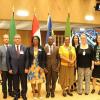News
Displaying Results 26 - 50 of 150
According to a recently published UNECE Policy Paper, the agrifood, the garment and footwear and the mineral sectors contribute significantly to the economic growth and employment in the UNECE region, while being major sources of global greenhouse gases (GHG) and environmental pollution. Evidence…
Transparency in the environmental performance of economic activities and effective public access to environmental information, especially on products, are indispensable in addressing pressing environmental challenges. This also supports a just transition towards a green and circular economy,…
In the UNECE region, the Fourth Cycle of Environmental Performance Reviews (EPR) kicks off with the review of Tajikistan, carried out for the fourth time under the leadership of UNECE.
A large, multidisciplinary team of international experts worked in Dushanbe from 6 to 15 November 2023,…
The European Commission has proposed a new legislation, the European Critical Raw Materials Act, to ensure a secure and sustainable supply of critical raw materials for the EU. The Act, on which the European Parliament and the European Council reached a provisional agreement on 13 November,…
Strong private sector engagement positively impacts the relevance, legitimacy, and credibility of national trade facilitation bodies (NTFBs) and encourages a business-centric approach to trade facilitation. Over the past several years, governments, donors and international organizations have…
In the pan-European region, citizens are feeling the impacts of climate change through extreme weather events. This undermines equitable access to water and sanitation as human rights, due to increasing water scarcity and increased burden of water diseases due to overflow of untreated sewerage…
Transboundary rivers, lakes, and aquifers play a vital role in supporting the livelihoods of billions of people worldwide. Roughly 60% of global freshwater flow is in shared basins. About 40% of the world’s population lives in shared basins. The development and management of transboundary water…
Central Asia has significant untapped potential to decarbonize its energy systems and accelerate the sustainable energy transition, including through renewable energy development and enhanced resource management. To help the region capitalize on these opportunities, UNECE, the United Nations…
Almost all of Botswana’s territory sits within transboundary rivers basins. Although landlocked, Botswana is therefore a ‘water-linked’ country. The Cubango-Okavango, Limpopo, Orange-Senqu and Zambezi Rivers all provide crucial freshwater arteries that supply people and nature, including the…
UNECE support for the revision of the Georgian Mining Code Act is shaping the future of resource classification and estimation standards in Georgia. During a workshop in Tbilisi participants discussed how Georgian standards could play a crucial role in harmonizing with the global dimensions of the…
Clothing production has doubled in the past 15 years. In 2018, the fashion industry produced around 2.1 billion tons of greenhouse gas emissions (GHG) – 4% of the world’s total – leading to major environmental, health and social challenges. In 2020 in Europe, textile consumption had the third…
An estimated 3.6 billion people face inadequate access to water at least a month per year – a figure expected to increase to more than 5 billion by 2050. According to WMO, over 50% of global catchment areas and reservoirs displayed deviations from normal conditions in 2022, of which the majority…
The ongoing repercussions of the COVID-19 pandemic, geopolitical instability, and elevated inflation rates continue to pose challenges to global trade, with the World Trade Organization (WTO)'s trade growth forecast now estimated at only 0.8% this year.
As the global trade landscape grapples…
In the Drina River Basin, shared mainly by Bosnia and Herzegovina, Montenegro and Serbia, working together across borders and jointly addressing water and energy challenges is a key part of effective climate action and the green transition.
As part of the Sarajevo Energy and Climate Week (25-29…
Taking up some of the main results of the recent review report, which assessed the effectiveness of the amended Protocol to Abate Acidification, Eutrophication and Ground-Level Ozone (Gothenburg Protocol) under the UNECE Convention on Long-range Transboundary Air Pollution, experts discussed…
Bringing together countries to share progress and experience on how to effectively manage their shared waters is a key characteristic of the Water Convention. Cooperation for the management of transboundary waters to promote sustainability, peace and security is the Convention’s mantra - especially…
Since September 2022, as part of “The Sustainability Pledge” initiative, UNECE has been working with fashion company Stella McCartney and its Cotton supplier SÖKTAS to trace a T-shirt made of jersey fabric through documentary evidence.
The UNECE blockchain platform allows to capture all actors…
Central Asian countries are actively working towards improving access to water and sanitation. Despite recent progress, Kazakhstan's aging infrastructure, lack of human resources and financial constraints still limit the access of rural population to improved water and sanitation services. In 2022…
For some time now, Uzbekistan has been engaged in various activities under the UNECE Convention on Access to Information, Public Participation in Decision-making and Access to Justice in Environmental Matters (Aarhus Convention).
An international round table entitled “Aarhus Convention: Effective…
As the global economy emerges from the COVID-19 pandemic and governments strengthen efforts to “build-back-better”, trade as an engine of growth has re-emerged in policy agendas. For developing countries and countries with economies in transition that are still in the process of accession to the…
Over two-thirds of Togo’s water resources are shared, notably through the Mono River basin (shared with Benin) and Volta River basin (shared with Benin, Burkina Faso, Côte d’Ivoire, Ghana and Mali), as well as aquifers in the coastal sedimentary basin (shared with Ghana, Benin and Nigeria).
In a…
On 8 June 2023 Namibia became the first Southern African country, and 8th country in Africa, to accede to the Convention on the Protection and Use of Transboundary Watercourses and International Lakes (UN Water Convention).
Namibia, which has a population of some 2.5 million people, shares…
Momentum is growing on the digitalization of the Middle Corridor, linking the European Union and Asia, through Central Asia, the Caucasus, Türkiye and Eastern Europe, through the use of UNECE and UN/CEFACT standards for digitalization of multimodal data and document exchange.
Representatives of…
To address the conclusions of the review of the amended Protocol to Abate Acidification, Eutrophication and Ground-Level Ozone (Gothenburg Protocol), as adopted by the Executive Body to the UNECE Convention on Long-range Transboundary Air Pollution in December 2022, further work is currently being…
Finland and the Republic of Namibia, both countries which are strong advocates for transboundary water cooperation in their respective regions and globally, have just embarked on a two-year pilot Twinning Initiative to exchange experiences, build capacity and strengthen bilateral cooperation on…
























